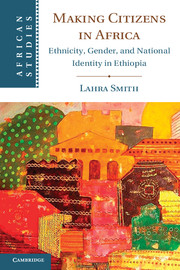Book contents
- Frontmatter
- Contents
- Maps and Tables
- Acknowledgments
- Abbreviations
- Glossary
- Maps
- Introduction
- The Challenge
- The Response
- 3 Popular Responses to Unequal Citizenship
- 4 A Referendum on Ethnic Identity and the Claims of Citizenship
- 5 No Going Back on Self-Determination for the Oromo
- 6 Ethiopian Women and Citizenship Rights Deferred
- Conclusion
- Appendix I Methodology
- Appendix II Questionnaire for Parents and Community Members (English)
- Appendix III Questionnaire for School Directors
- Appendix IV Questionnaire for Teachers
- Bibliography
- Index
Conclusion
Published online by Cambridge University Press: 05 May 2013
- Frontmatter
- Contents
- Maps and Tables
- Acknowledgments
- Abbreviations
- Glossary
- Maps
- Introduction
- The Challenge
- The Response
- 3 Popular Responses to Unequal Citizenship
- 4 A Referendum on Ethnic Identity and the Claims of Citizenship
- 5 No Going Back on Self-Determination for the Oromo
- 6 Ethiopian Women and Citizenship Rights Deferred
- Conclusion
- Appendix I Methodology
- Appendix II Questionnaire for Parents and Community Members (English)
- Appendix III Questionnaire for School Directors
- Appendix IV Questionnaire for Teachers
- Bibliography
- Index
Summary
During a training session for high school teachers on the revised civic education curriculum in Ethiopia in 2003, I had the opportunity to discuss at some length a concept that is unique and somewhat central to the Ethiopian worldview. The teachers themselves raised the concept of yeluññeta and wondered how it might “obstruct democratization.” Yeluññeta is both a cultural value and a practice in Ethiopia. It is defined as “sensitivity to opinions of others, regard for others’ feelings, concern about public opinion, sense of the proprieties.” It refers to reserved and respectful behavior, a special sensitivity to the opinions of others – even a kind of conformity. Yeluññeta tells Ethiopians to defer to others when in a group, particularly older people and those in positions of authority. It can involve self-sacrifice (not eating first or taking as much food as one wants) or not giving one’s opinion in certain social contexts. The teachers of civics noted that Ethiopians might at times appear passive and agreeable because yeluññeta would prevent them from openly disagreeing with those in positions of authority. But that does not always mean they agree or are convinced. Yeluññeta would inform a particular type of response that is deferential and respectful, although not at all suggesting agreement or conformity. The teachers asked how something like yeluññeta might impact democracy promotion, and I could substitute here citizenship expansion, if not everyone felt free to share diverse opinions and experiences.
- Type
- Chapter
- Information
- Making Citizens in AfricaEthnicity, Gender, and National Identity in Ethiopia, pp. 192 - 204Publisher: Cambridge University PressPrint publication year: 2013

